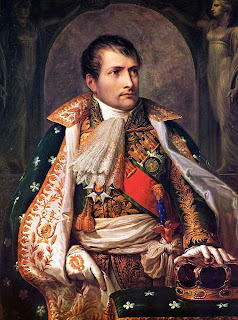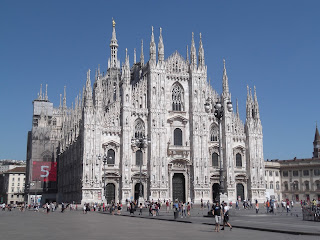French Emperor places Iron Crown of Lombardy on his own head
 |
| Portrait of Napoleon Bonaparte by the Italian artist Andrea Appiani in 1805 |
He crowned himself at a ceremony in the Duomo using the Iron Crown of Lombardy.
The title King of Italy signified that Napoleon was the head of the new Kingdom of Italy, which was at that time a vassal state of the French Empire. The area controlled by Napoleon had previously been known as a republic, with Napoleon as its president.
But Napoleon had become the Emperor of France the year before and had decided Italy should become a Kingdom ruled by himself, or a member of his family.
Before the ceremony, the Iron Crown had to be fetched from Monza. The crown consisted of a circlet of gold with a central iron band, which according to legend was beaten out of a nail from Christ’s true cross, found by Saint Helena in the Holy Land. The crown is believed to have been given to the city of Monza in the sixth century.
During his coronation, Napoleon is reported to have picked up the precious relic, announced that God had given it to him, and placed it on his own head.
After the coronation there were celebratory fireworks in Milan and over the next few days there were horse races, public amusements in the streets and parks, and a grand concert and ball.
The new King appointed his stepson, Eugene de Beauharnais, as his viceroy in Italy. De Beauharnais was Josephine’s son from her previous marriage. Napoleon also later gave him the title of Prince of Venice.
The new Kingdom of Italy lasted till 1814 when Napoleon had to abdicate from the thrones of both France and Italy and go into exile on the island of Elba.
 |
| The magnificent Duomo in Milan, where Napoleon proclaimed himself as King of Italy in 1805 |
Construction of the Duomo in Milan began in 1386 using marble brought into the city along the Navigli canals. Although it was consecrated as a Cathedral in 1418, building work was not finally completed until the 19th century when Napoleon had the façade finished before his coronation.
Travel tip:
The Iron Crown of Lombardy is kept in a chapel in the Cathedral of Saint John in Monza, a city about nine miles to the north east of Milan. Monza is now also famous for its Grand Prix motor racing circuit, the Autodromo Nazionale Monza, which hosts the Formula One Italian Grand Prix.
Home


